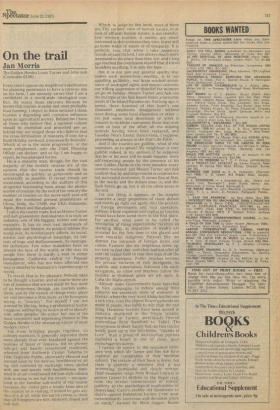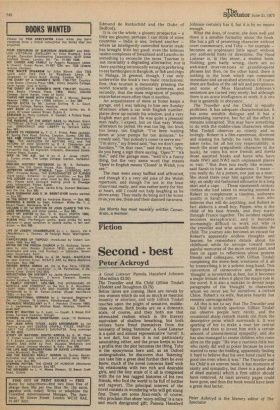On the frail
Jan Morris
The Golden Hordes Louis Turner and John Ash (Constable £5.00) Every time I oppose my neighbour's application for planning permission to have a caravan site on his farm, I am 'uneasily aware that I am a combatant in a world-wide ideological conflict. He wants those caravans because he knows that tourism is easier and more profitable than farming: I object to them because I think tourism a degrading and corrosive influence upon an agricultural society. Behind me I have all those who believe that a national culture should be cherished and protected per se: behind ‘him are ranged those who believe that the cross-fertilisation of manners, if only for a• Bank Holiday weekend, is necessarily desirable. Which of us is the more progressive, or the more enlightened, only the Chief Planning Officer can declare: and so far, I am happy to report, he has plumped for me.
He is a minority man, though, for the vast majority of the world's citizens are of the opinion that the tourist trade should be encouraged as quickly, as generously and as universally as possible. If recent trends are maintained, according to the authors of this altogether fascinating book about the phenomenon of tourism, by the end of the century the number of tourists on the move each year will equal the combined present populations of China, India, the USSR, the USA, Indonesia, Japan, Brazil and Bangladesh. I call it the tourist trade, but as Messrs Turner and Ash gruesomely demonstrate, it is truly an industry, one of the biggest, richest and most explosive. It has its own vast meshwork of subsidiary and finance, its political lobbies the world over, its revolutionary effects, its social, artistic and psychological meanings, its fallouts of hope and disillusionment, its inescapable pollutions. Few other industries have so altered the face of the world, or the way its people live: there is hardly a soul in either hemisphere, California realtor to Papuan mud-dancer, who has not been affected one way or another by humanity's ceaseless urge to travel.
To travel, that is, for pleasure. Nobody likes to be thought a tourist, and of course there are lots of journeys that are not made for fun: most of us westerners, though, are tourists sometimes, and by the nature of things every place we visit becomes a little more, as the bourgeois saying is, "touristy". For myself I am not worried by the tag, being a professional tourist I suppose, and having no desire at all to identify with other peoples' life-styles: but one of the most consistent and depressing themes in The Golden Hordes is the alienating nature of most modern travel.
Far from bringing people together, its authors maintain, it generally separates them more sharply than ever. Insulated against the realities of Spain or Jamaica, fed on phoney folk-art and hastily resurrected traditions, whisked from Authentic Cretan Taberna to Olde Englyshe Pubbe, alternately cheated and fawned upon by the natives, bewildered by jet lag and confused by exchange rates, peeled with sun and queasy with bouillabaisse, deposited in an air-conditioned African-style cabana with nothing to see but the ocean — encapsulated in the familiar sub-world of the tourist business, the visitor .gets a totally false idea of the country he is visiting, if indeed he gets any Idea of it at all, while the native comes to think that all foreigners are rich, blistered, doped and half-daft.
Which, to judge by this book, most of them are. The authors' view of human nature, or at least of affluent human nature, is not cheerful. Few western tourists, it seems, are much interested in the countries they visit; fewer still go home wider of vision or of sympathy. It is perfectly true that when I take American friends around Oxford, I am always much more interested in the place than they are: and I long ago reached the conclusion myself that if travel broadens anything, it is only the hips.
But It is not just our general apathy that makes such melancholy • reading: it is our appalling gullibility, our brain-washed acceptance of packaged sights and instant cultures, our willing suspension of disbelief the moment we go on holiday. Messrs Turner and Ash cite the example of the Bali Beach Hotel, a favourite resort of the Island Paradise set. Not long ago, it seems, three hundred of this hotel's . one thousand employees disappeared without trace during some local dissension or other — yet just some local dissension or other it remains to its blithe customers, those that ever come to hear of the affair, all the missing menials having since been replaced, and Tuesday Nite's Exotic Dance-Gala, I suppose, proceeding as always in the Star-Lite Patio.
And if the tourists are gullible, what of the touristees, so to speak? My neighbour is very gullible indeed, in my opinion, if he supposes that he or his sons will be made happier, more self-respecting people by the presence of his own Golden Horde in the, river meadow every summer weekend: and Messrs Turner and Ash confirm that by and large tourist economies are not successful economies. It seems fine at first, as the marks and the dollars pour in, and the flash hotels go up, but it all too often sours in the end.
For one thing, it appears, in the simpler countries a large proportion of those dollars and marks go right out again, into the pockets of foreign developers and tour operators, without whose expertise and capital no tourists would have been lured there in the first place. For another, what used to be called the 'revolution of rising expectations' receives an alarming fillip, as disparities of wealth are revealed for the first time to the glazed and soon resentful indigenes. Patriots like me distrust the intrusion of foreign styles and values. Farmers like my neighbour wake up, too late, to find they wish they had not after all sold the corner field to that nice man from the property developers. Public beaches become the private enclaves of rich foreigners. As syphilis and tuberculosis followed the early navigators, so crime and mayhem follow the tourists: in Scotland, gates are left open, in Cuba the Mafia arrives.
Already some Governments have launched Be Nice campaigns, to induce among their subjects the necessary smile of welcome: in Hawaii, where the very word Aloha has become a sick joke, even the airport flower garlands are made of plastic, less liable to wilt than the real thing. Harmless tourists have been stoned in Jamaica, murdered in the Virgin Islands, imprisoned in Turkey, mercilessly fleeced everywhere from Stratford to Tahiti. -The honeymoon is short: hardly had the first tourist hotels gone up in the Seychelles, "Islands of 'Love", than a group of anti-tourism patriots exploded a bomb in one of them, pour encourager les autres. I cannot do justice to the sustained brilliance with which Mr Turner and Mrs Ash have explored the complexities of their immense subject. The texture of their book is dense, but there is scarcely a sentence that is not interesting, purposeful and clearly written. Their examples range from Roman tourists in ancient Greece to drifters on the Nepal trail, from the sexual connotations or tourist publicity to the psychological implications of Disneyland, Cairo's shabby old Semiramis to Haiti's opulent Habitation Leclerc (-the most extraordinarily lascivious and decadent place on earth," backed by Mick Jagger, Baron Edmund de Rothschild and the Duke of Bedford).
It is, on the whole, a gloomy prospectus a little too gloomy, perhaps. I can think of some countries India is one, Ireland another where an intelligently controlled tourist trade has brought little but good: even the hideous casino-complexes of Swaziland and Lesotho do something to reconcile the races. Tourism is not invariably a degrading alternative, nor is there anything intrinsically wrong in preferring to eat hamburgers in Bangkok, or fish and chips in Malaga. In general, though, I can only underwrite the book's two basic conclusions: first, that tourism is inexorably pressing the world towards a synthetic sameness, and secondly, that the mass migration of peoples exacerbates more often than it soothes.
An acquaintance of mine at home keeps a garage, and I was talking to him one Sunday afternoon when a car with English numberplates drew up outside his window, and a very English man got out. He was quite a pleasant man really, I expect, but on that easy Welsh afternoon he jarred. He was too big, too loud, too bossy, too English. "I've been waiting down at your pumps for ten minutes," he crossly said, "but nobody's come to serve me." "I'm sorry," my friend said, "but we don't open Sundays," "In that case," said the man, "why do you hang a sign there saying, 'Open'?" "Ah that," said the garage man, "well it's a funny thing, but the very same word that means `Open' in English means `Closed' in Welsh, you see."
The man went away baffled and affronted, and though it's a very old joke of the Welsh repertoire, and though I'm not in the least chauvinist really, and was rather sorry for him at heart, still I could not help laughing as he drove away. They really do bring out the worst in us, you see, them and their damned caravans.
Jan Morris has most recently written Conundrum, a memoir.



































 Previous page
Previous page